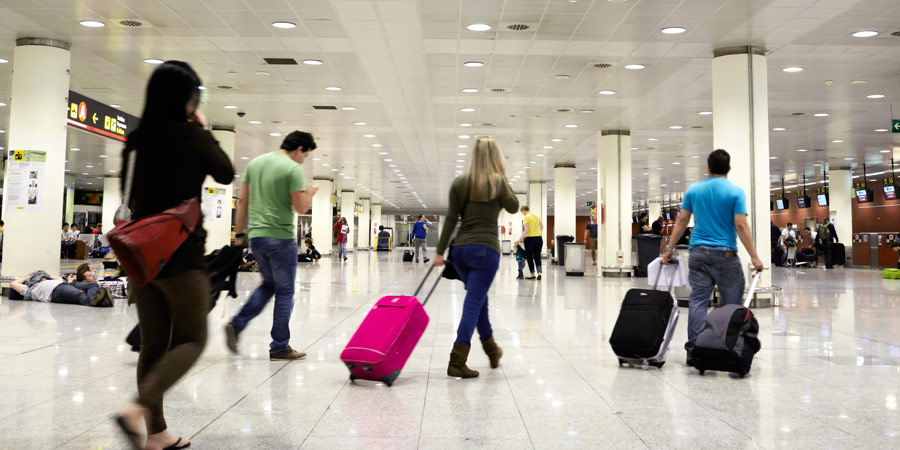
Traveling is a universally enjoyed activity that fulfills various human desires and needs, whether it’s seeking adventure, escaping the monotony of daily life, or immersing oneself in different cultures. For some, it’s a way to relax and unwind, while others see it as a chance to explore and gain new experiences. This article will explore the top reasons why people love to travel, delving into the psychological, cultural, social, and emotional factors that make travel such a popular and fulfilling endeavour. Whether you’re a seasoned traveler or someone dreaming of their next getaway, understanding why we travel offers a deeper appreciation for the journey.

1. The Quest for Adventure
Why Adventure Appeals to Travelers
One of the most common reasons people travel is the quest for adventure. Adventure often represents the excitement of the unknown and the thrill of exploring new places. It pushes people out of their comfort zones and helps them grow mentally and physically. For many, travel is an antidote to everyday life’s predictability.
Adventure can take many forms: from zip-lining through rainforests to diving into the depths of the ocean to scaling mountain peaks, the world offers endless opportunities for those who crave excitement. Even something as simple as navigating a foreign city or learning to cook a traditional dish can offer a sense of adventure.
Popular Adventure Travel Activities
Hiking and Trekking: Whether exploring the Inca Trail in Peru or the Appalachian Trail in the U.S., hiking allows travelers to immerse themselves in nature and experience breathtaking landscapes.
Scuba Diving: Exploring coral reefs or shipwrecks offers a unique perspective of marine life and the underwater world.
Extreme Sports: Adventure seekers often travel for adrenaline-pumping activities like bungee jumping, skydiving, or white-water rafting.
The Thrill of Discovery
Adventure appeals to a fundamental aspect of human nature—the desire to explore and discover. Humans have always been drawn to the thrill of discoveries, from ancient explorers like Marco Polo to modern-day backpackers. Travel satisfies this curiosity, helping people break free from routine and experience the world with fresh eyes.
2. Cultural Immersion and Learning
Experiencing Different Cultures Firsthand
Another significant reason people travel is to immerse themselves in different cultures. Unlike reading about foreign cultures or watching documentaries, travel allows for direct interaction with local traditions, languages, and customs. Through cultural immersion, travelers can gain a deeper understanding of the world and foster a greater sense of empathy and global citizenship.
Whether visiting a remote village in Thailand or attending a flamenco show in Spain, cultural immersion offers travelers a chance to see how other people live, work, and celebrate. For some, this could mean attending religious festivals, exploring historic landmarks, or even staying with local families to experience life as a native.
Key Aspects of Cultural Immersion
Language Learning: Many travelers take the opportunity to learn new languages or at least familiarize themselves with key phrases in the local language. This not only enhances communication but also shows respect for the local culture.
Cuisine: Food is a central part of culture. Tasting traditional dishes from different regions allows travelers to understand the history, geography, and values of the culture they are visiting.
Arts and Festivals: Attending local festivals, concerts, or art exhibitions is another way to dive deep into a culture’s heart.
Cultural Learning and Personal Growth
Travel is a form of education, and the lessons learned through cultural immersion can be profound. It broadens perspectives, breaks down prejudices, and teaches tolerance. Many people return from their travels with a deeper appreciation for cultural diversity and a more open-minded view of the world.
3. Escaping the Routine and Stress Relief
Travel as a Break from Daily Life
In today’s fast-paced world, many people use travel to escape from everyday life’s stresses. Whether it’s a demanding job, personal challenges, or simply the monotony of daily routines, travel offers a much-needed break from responsibilities. Travelers can temporarily disconnect from their daily worries and recharge their mental batteries by stepping into a new environment.
Planning a trip can reduce stress, giving people something to look forward to. For this reason, many people consider travel a form of therapy. Whether it’s lounging on a tropical beach, hiking through peaceful mountains, or indulging in spa treatments, travel’s relaxation is essential for mental well-being.
Psychological Benefits of Travel
Stress Reduction: Travel helps reduce stress by offering a change of scenery and pace. New environments can help the brain reset and improve overall mood.
Mental Health Improvement: Stepping away from daily responsibilities allows the mind to relax, which has been shown to improve mental health and well-being.
Increased Happiness: Studies have shown that people feel happier after traveling, as new experiences bring joy and satisfaction. Even the anticipation of a trip can increase happiness levels.
The Importance of Disconnecting
In an era where technology keeps us constantly connected, travel offers a unique and essential chance to disconnect. Many travelers find solace in stepping away from screens, social media, and the internet, choosing instead to engage with the natural world and the people around them. This digital detox is not just a luxury but a necessity, allowing individuals to fully immerse themselves in their travel experiences and return home feeling refreshed and rejuvenated.

4. Personal Growth and Self-Discovery
Travel as a Tool for Self-Reflection
Many people view travel as an opportunity for personal growth and self-discovery. Traveling forces individuals out of their comfort zones, presenting them with challenges they may not encounter daily. Whether it’s learning how to navigate a foreign city, communicating in a new language, or dealing with unexpected situations, these experiences help people develop resilience, problem-solving skills, and confidence.
Solo travel, in particular, is often seen as a transformative experience. Without the comfort of familiar faces or places, solo travelers are forced to rely on themselves, which fosters independence and self-reliance. Many solo travelers return home with newfound self-confidence and clarity about their goals.
How Travel Encourages Personal Growth
Resilience and Adaptability: Travel, especially to unfamiliar destinations, often requires quick thinking and adaptability. Travelers learn to go with the flow, gracefully handling unexpected delays, language barriers, or cultural differences.
Self-Reliance: Solo travel encourages self-reliance, as individuals must make decisions independently and navigate foreign environments independently.
Perspective Shifts: Exposure to different ways of life and new experiences often shifts a traveler’s perspective on their own life, values, and goals. Travel encourages self-reflection, leading to personal growth and a deeper understanding of one’s desires and aspirations.
5. Strengthening Relationships
Shared Experiences Bring People Closer
Traveling with family, friends, or a significant other can strengthen bonds and create lasting memories. Shared experiences, especially those outside the routine of everyday life, allow people to connect on a deeper level whether it’s overcoming challenges together or simply enjoying new activities, traveling as a group fosters more robust relationships.
Family vacations, for instance, provide quality time away from the distractions of work, school, and other obligations. Couples often find that traveling together deepens their relationship as they learn more about their preferences, patience levels, and communication styles. Friendships, too, can flourish during travel, as shared adventures and discoveries create memories that last a lifetime.
How Travel Strengthens Relationships
Shared Experiences: Exploring new places together creates a shared sense of adventure and accomplishment. These shared experiences can deepen emotional connections and create lasting memories.
Quality Time: Travel offers an opportunity to spend quality time with loved ones, away from the distractions of daily life. This undivided attention helps strengthen relationships.
Overcoming Challenges Together: Whether it’s getting lost in a foreign city or dealing with unexpected travel hiccups, working together to overcome challenges strengthens bonds and fosters teamwork.
6. The Freedom of Solo Travel
Why Solo Travel is Becoming Popular
Solo travel has gained immense popularity recently, especially among millennials and young professionals. For many, traveling alone offers freedom and independence that group travel cannot. Solo travelers have the flexibility to create their itineraries, follow their interests, and make spontaneous decisions without compromising with others.
This independence allows solo travelers to engage more deeply with their surroundings, whether it’s through meeting new people, exploring hidden gems, or immersing themselves in a new culture. Solo travel often leads to self-discovery, as individuals spend time reflecting on their thoughts, desires, and goals.
Benefits of Solo Travel
Freedom to Explore: Solo travelers can plan their trips according to their interests and schedules, offering complete freedom in spending their time.
Self-Confidence Boost: Navigating a new environment alone can empower, increasing self-confidence and independence.
Opportunities for Reflection: Traveling alone provides ample time for introspection and self-reflection, allowing individuals to clarify their life and future goals.
7. Stepping Outside Comfort Zones
The Appeal of the Unknown
Traveling often requires people to step outside their comfort zones, both physically and mentally. This might mean trying unfamiliar foods, speaking a different language, or navigating foreign public transportation systems. While intimidating at first, these challenges can lead to personal growth and a sense of accomplishment.
For many, stepping outside their comfort zones is one of the most rewarding aspects of travel. It allows individuals to push their boundaries, face their fears, and grow. The more travelers challenge themselves, the more they develop resilience, problem-solving skills, and adaptability.
Why Stepping Out of Comfort Zones is Important
Personal Growth: Overcoming challenges while traveling helps build resilience and adaptability, which are valuable skills in all aspects of life.
Increased Confidence: Facing fears and navigating unfamiliar situations gives travelers a sense of achievement and boosts their self-confidence.
New Perspectives: Experiencing different cultures, customs, and ways of life broadens horizons and helps travelers develop a more open-minded view of the world.
8. Capturing Memories Through Photography
Travel Photography as a Creative Outlet
For many people, capturing memories through photography is a crucial reason to travel. Travel photography allows individuals to document their experiences, preserve memories, and share their journeys with others. Whether capturing a stunning sunset, a bustling market, or a quiet moment of reflection, travel photography is a creative outlet that enhances the travel experience.
Social media platforms like Instagram have also fueled the rise of travel photography, with many travelers using these platforms to share their adventures with a global audience. For some, travel photography is more than just a hobby—it’s a way to connect with other travellers, inspires future trips, and showcase the world’s beauty.
The Importance of Capturing Travel Memories
Preserving Memories: Travel photography allows travelers to capture moments and memories they can look back on for years.
Creative Expression: Photography offers an innovative way to document and share the beauty of different destinations and cultures.
Inspiring Others: Sharing travel photos on social media or personal blogs can inspire others to explore new destinations and embark on their travel adventures.
9. Culinary Exploration
Exploring the World Through Food
Food is integral to travel, offering a delicious way to experience new cultures and regions. Many travel specifically to indulge in local cuisines and sample dishes they can’t find at home. From street food stalls in Southeast Asia to fine dining experiences in Europe, culinary exploration is a major draw for travelers.
Tasting local food not only satisfies the palate but also provides insight into a place’s culture, history, and traditions. Whether it’s learning to cook a traditional dish in Italy or sampling exotic fruits in a Thai market, food is a vital part of any travel experience.
The Role of Food in Travel
Cultural Connection: Trying local dishes offers a deeper understanding of a region’s culture, traditions, and history.
Memorable Experiences: Culinary experiences, such as visiting a vineyard in France or enjoying a traditional Japanese tea ceremony, create lasting memories.
Diverse Flavors: Travel allows people to explore various flavors, textures, and cooking techniques, broadening their culinary horizons.
10. Experiencing Natural Beauty
The Allure of Nature
Many travelers seek out destinations known for their natural beauty. Whether it’s hiking through the Alps, lounging on a tropical beach, or exploring a national park, nature provides a peaceful escape from the hustle and bustle of city life. The awe-inspiring landscapes, diverse wildlife, and tranquil environments found in nature are a significant draw for travelers looking to unwind and reconnect with the natural world.
For some, the beauty of nature is the highlight of their trip, offering moments of reflection, inspiration, and wonder. Travelers often return from these experiences with a renewed appreciation for the planet and a desire to protect its natural wonders.
Why People Travel for Natural Beauty
Mental Health Benefits: Spending time in nature has been shown to reduce stress, improve mood, and enhance overall well-being.
Physical Activity: Many nature-based travel experiences, such as hiking, swimming, or kayaking, encourage physical activity, which can contribute to better health.
Environmental Awareness: Travel to natural destinations often fosters a greater appreciation for the environment and a desire to support conservation efforts.
11. The Pursuit of Novelty
Why People Seek New Experiences
The human brain is wired to seek novelty and stimulation. Travel provides endless new experiences, from unfamiliar sights and sounds to different cultures and traditions. This constant exposure to new stimuli keeps the brain engaged and curious, contributing to excitement and satisfaction.
For many travelers, pursuing novelty is one of the main reasons they love exploring new destinations. Whether it’s trying a new activity, visiting a unique landmark, or simply navigating a foreign city, travel offers a wealth of opportunities to experience something new.
The Benefits of Novelty in Travel
Mental Stimulation: New experiences activate the brain’s reward centers, creating excitement and joy.
Breaking the Monotony: Travel breaks up the routine of everyday life, offering a refreshing change of pace and perspective.
Continuous Learning: Travel offers endless opportunities to learn something new, whether about a different culture, a historical event, or a unique way of life.
12. A Sense of Achievement
Travel as a Personal Accomplishment
Travel can also be a source of personal achievement. For many, visiting certain destinations or completing specific travel-related goals, such as hiking a famous trail or attending a cultural festival, is significant. These travel milestones provide a sense of fulfillment and satisfaction, motivating people to continue exploring new places.
Overcoming the challenges associated with travel, such as language barriers, cultural differences, or logistical hurdles, also contributes to a sense of achievement. Successfully navigating a foreign country, for example, can boost confidence and foster a sense of pride in one’s abilities.
Why Achievement Matters in Travel
Goal Fulfillment: Reaching a long-desired destination or completing a challenging activity provides a deep sense of satisfaction and accomplishment.
Overcoming Challenges: Dealing with travel’s unpredictability, such as missed flights or language barriers, helps build resilience and confidence.
Personal Growth: Achieving travel-related goals fosters personal growth and inspires individuals to set and pursue new challenges in other areas of life.
Conclusion
People are drawn to travel for a multitude of reasons, each as unique as the individual. Whether it’s the thrill of adventure, the allure of cultural immersion, the need for relaxation, or the quest for personal growth, travel offers a myriad of opportunities for enrichment, learning, and self-discovery.
At its core, travel satisfies fundamental human needs—the desire for novelty, connection, and exploration. In an increasingly interconnected world, the reasons for travel are as diverse as the destinations themselves. Ultimately, travel is a deeply personal experience that enhances our understanding of the world and our place within it, leaving a lasting impact on our hearts and minds.






